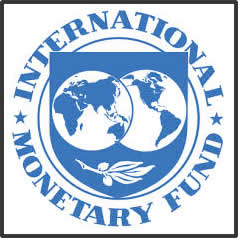Friday, March 07, 2014 3.36 PM / Press Release No. 14/85
On February 21, 2014, the Executive Board of the International Monetary Fund (IMF) concluded the Article IV consultation1 with Nigeria.
Real GDP is projected to grow at 6.4 percent in 2013 owing to continued strong performance in the non-oil sector. Inflation declined to 7.9 percent at year end, supported by lower food price, fiscal consolidation, and a tight monetary policy stance. The external current account surplus fell to 3.1 percent of GDP from 7.8 percent at end-2012, but reserves remained at a comfortable 5.6 months of next year’s imports, despite uncertainties about the timing of the tapering of unconventional monetary policies. The non-oil primary deficit of the consolidated government is projected to narrow from expenditure restraint, but a shortfall in oil revenues resulted in a drawdown of the Excess Crude Account (ECA), a key fiscal buffer. Despite significant job creation, unemployment and poverty are high and social indicators lag those of peers. Continued weaknesses in labor markets, access to electricity, cost of doing business, and small and medium enterprises’ access to finance have prevented a transition to a more robust and inclusive growth path.
Economic growth is expected to improve further in 2014, driven by agriculture, trade, and services. Inflation should continue to decline, with lower food prices from higher rice and wheat production and supported by a tight monetary policy and a budget execution that maintains medium-term consolidation objectives. The current account is also expected to improve. Key risks to be managed include: (i) uncertainty about the pace of global recovery; (ii) unwinding of UMP; (iii) persistently lower oil prices; (iv) persistent oil production losses; (v) continuation of insurgency in the North; and (vi) slow implementation of reforms.
Sound and balanced economic policies over the medium term are critical. Policies should focus on rebuilding external and fiscal buffers, avoiding spending pressures from the political cycle, strengthening the transparency and governance of the oil sector, and enhancing financial stability, while promoting the availability of and access to finance. Over the medium term, it will be vital to ensure the steady implementation of the wide-range of structural reforms necessary to improve competitiveness and productivity, boost growth and job creation, strengthen governance, and build social cohesion.
Executive Board Assessment2
Executive Directors welcomed Nigeria’s continued strong macroeconomic performance, underpinned particularly by sustained high growth in the non oil sector. Inflation has continued to decline and the reserves position is adequate. While the economic outlook remains favorable, key risks include continued lower oil revenues from oil production losses and lower oil prices, the impact from the unwinding of unconventional monetary policy in advanced economies, and domestic political and security uncertainties. Directors underscored that steadfast implementation of prudent macroeconomic policies and reforms will be essential to address the risks and vulnerabilities, generate more inclusive and balanced growth, and reduce unemployment.
Directors welcomed the authorities’ continued commitment to fiscal consolidation and noted the improvements made to the fiscal framework. However, to ensure macroeconomic stability, they emphasized the need to rebuild fiscal buffers and to strengthen the framework further. Efforts should be geared towards boosting non oil revenue by broadening the tax base, improving tax administration and curtailing exemptions, and further reducing oil subsidies. Directors underscored that adopting a rule based reference oil price in fiscal projections and further strengthening public financial management should help the authorities achieve their consolidation objectives. They also highlighted the need for improving oil revenue management, including by completing the transition from the Excess Crude Account to the Sovereign Wealth Fund. These measures should be supported by full implementation of the Treasury Single Account and the integrated information management systems. Maintaining fiscal discipline in the run up to the elections is also important.
Directors called for strong action to address oil theft and production losses. They advised the authorities to strengthen the regulatory framework by passing a sound Petroleum Industry Bill with enhanced oversight and transparency provisions. The framework for anti money laundering and combating the financing of terrorism could support these efforts.
Directors commended the authorities for lowering inflation and considered the current tight monetary policy stance to be appropriate, given the risks associated with potential capital flow reversals. To better manage liquidity, they generally encouraged more reliance on open market operations to guide short term interest rates. With regard to exchange rate policy, Directors noted that greater exchange rate flexibility could serve as an important buffer against external shocks.
Directors noted that the financial system is well capitalized with low non-performing loans. They recommended continued improvements in the supervisory framework, especially with regard to increased exposure from cross border financial activities. Directors encouraged the authorities to build on the progress made in strengthening prudential policies, including by further enhancing the framework for anti-money laundering and combating the financing of terrorism, and implementing the remaining Financial Sector Assessment Program (FSAP) recommendations. They welcomed the plan to wind down the operations of the Asset Management Corporation of Nigeria.
Directors emphasized that structural reforms remain critical to improve competitiveness and productivity, and reduce poverty and inequality. They encouraged the authorities to persevere with their Transformation Agenda with continued focus on education and health reforms, the improvement of power supply, and broadening agricultural production. Reform efforts should also aim at enhancing the business environment, improving productivity, boosting financial access to small and medium sized enterprises, and strengthening governance and institutional capacity. The upcoming release of re based GDP data and further improvements in statistical data collection should strengthen the basis for policy and private sector decision making in Nigeria.


| Sources: Nigerian authorities; World Bank; and IMF staff estimates and projections. |
| 1 GDP is now being rebased to a base year of 2010. |
1 Under Article IV of the IMF's Articles of Agreement, the IMF holds bilateral discussions with members, usually every year. A staff team visits the country, collects economic and financial information, and discusses with officials the country's economic developments and policies. On return to headquarters, the staff prepares a report, which forms the basis for discussion by the Executive Board.
2 At the conclusion of the discussion, the Managing Director, as Chairman of the Board, summarizes the views of Executive Directors, and this summary is transmitted to the country's authorities. An explanation of any qualifiers used in summing up can be found here.
 Lagos, NG • GMT +1
Lagos, NG • GMT +1











 3127 views
3127 views





 Sponsored Ad
Sponsored Ad
 Advertise with Us
Advertise with Us









